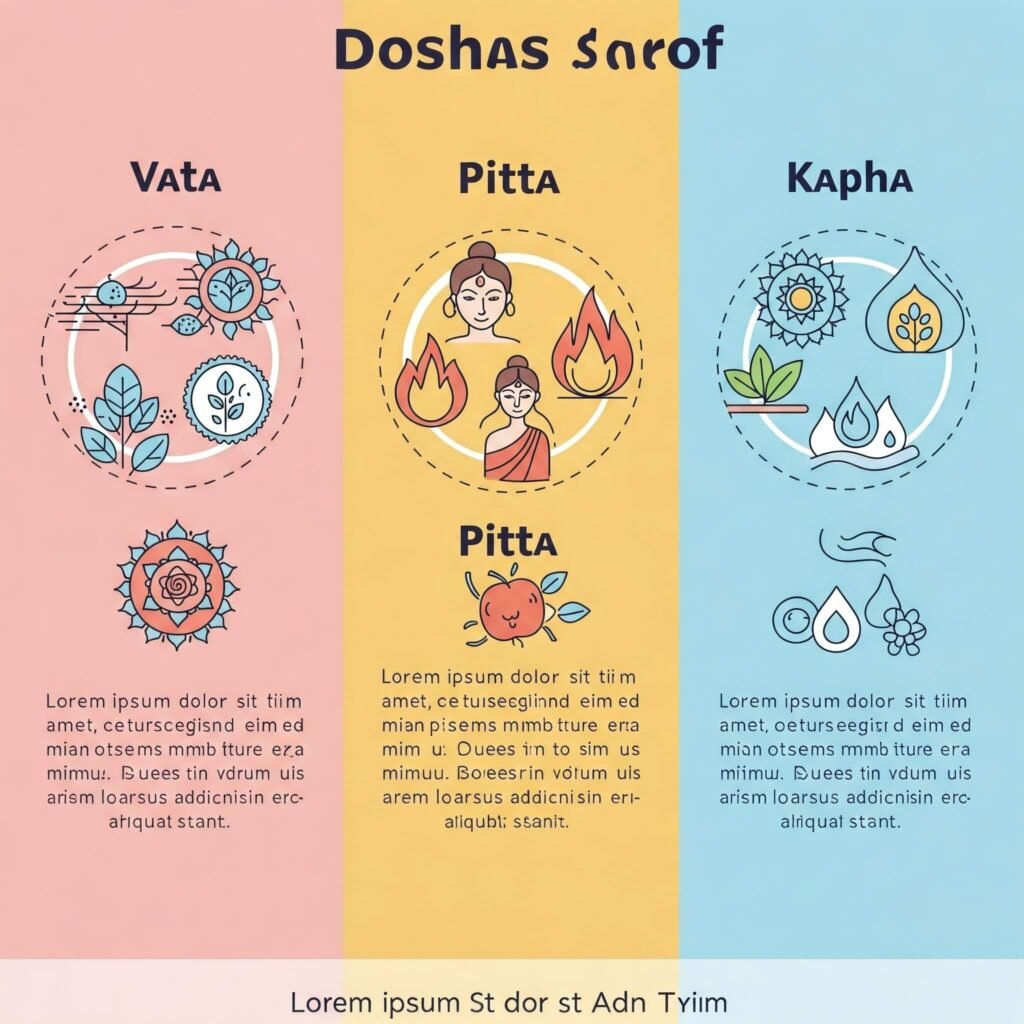Welcome to the world of Ayurvedic Skincare. This ancient holistic approach reveals your natural radiance. For centuries, Ayurveda, the traditional Indian system of medicine, has linked the mind, body, and spirit. This philosophy extends beautifully to skin care. Forget harsh chemicals and fleeting trends. Embracing Ayurvedic Skincare offers a sustainable path to vibrant, healthy skin. It does this by understanding your unique constitution and addressing imbalances from within.
Understanding Your Dosha for Personalized Ayurvedic Skin Health
In Ayurveda, the concept of “doshas” is fundamental to personalized Ayurvedic Skincare. These three primary energies – Vata, Pitta, and Kapha – govern our physical and mental characteristics. Understanding your dominant dosha is the first step. It helps in creating a personalized Ayurvedic Skincare routine that truly works for you.
- Vata and Natural Skincare: Characterized by dryness and lightness. Vata skin tends to be dry and prone to fine lines. Tailoring your natural skincare for Vata involves rich, nourishing ingredients.
- Pitta and Soothing Skincare: Associated with heat and intensity. Pitta skin is often sensitive and may experience redness. Cooling and soothing elements are key in a soothing skincare approach for Pitta.
- Kapha and Balancing Skincare: Embodies earthiness and heaviness. Kapha skin tends to be oily and can be prone to enlarged pores. Light and invigorating ingredients are beneficial in a balancing skincare regimen for Kapha.

Building Your Daily Ayurvedic Skincare Routine
A consistent daily routine is key in Ayurvedic Skincare. Here’s a step-by-step guide. It incorporates these ancient principles for achieving healthy, glowing skin.
Morning Ayurvedic Skin Care Ritual for a Radiant Complexion
- Cleansing in Your Ayurvedic Routine: Start your day with a gentle cleanse tailored to your dosha. For Vata skin, try a milk-based cleanser. Pitta skin benefits from cooling aloe vera or cucumber-based cleansers. Kapha skin can handle a slightly more invigorating cleanser. Consider ingredients like chickpea flour (besan).
- Toning in Natural Ayurvedic Skincare: Next, tone your skin with a natural hydrosol or toner appropriate for your constitution. Rosewater is excellent for Pitta and Vata. On the other hand, witch hazel (alcohol-free) can benefit Kapha skin.
- Moisturizing with Ayurvedic Oils: Then, nourish your skin with a dosha-specific oil or moisturizer.
- Vata: Sesame, almond, or avocado oil are ideal for addressing dryness.
- Pitta: Coconut, sunflower, or jojoba oil are often recommended for sensitivity.
- Kapha: Light oils like grapeseed or apricot kernel oil, used sparingly, suit oiliness.
- Sun Protection in Holistic Skincare: Finally, while traditional Ayurveda emphasizes natural ingredients, protecting your skin from excessive sun exposure is crucial. Consider using a natural sunscreen or a physical barrier like a hat.
Evening Ayurvedic Skin Care for Skin Rejuvenation
- Cleansing: Remove makeup and impurities with a gentle cleanser suitable for your dosha.
- Massage with Herbal Oils: Before bed, indulge in a gentle facial massage. Use a dosha-appropriate herbal oil. This promotes circulation and relaxation. You can find helpful facial massage techniques [Outbound Reference Link to a reputable Ayurvedic website explaining facial massage techniques, e.g., Banyan Botanicals or The Ayurvedic Institute].
- Night Treatment for Healthy Skin: Consider applying a light serum or night cream based on your skin’s needs.
Powerful Natural Ingredients in Ayurvedic Skincare
Ayurvedic Skincare harnesses the power of nature’s bounty for radiant health. Here are some key natural ingredients and their benefits for achieving glowing skin:
- Turmeric for a Bright Complexion: Known for its anti-inflammatory and antioxidant properties, it helps brighten the complexion and reduce blemishes. [Outbound Reference Link to a scientific article discussing the benefits of turmeric for skin, e.g., PubMed Central].
- Neem for Clear and Healthy Skin: Possesses antibacterial and antifungal properties. This makes it excellent for acne-prone and oily skin.
- Sandalwood for Soothing and Clear Skin: Cooling and soothing, it helps calm irritated skin and promotes a clear complexion. It is a prized ingredient.
- Aloe Vera for Hydrated and Calm Skin: Hydrating and healing, it’s beneficial for all skin types, especially Pitta.
- Triphala for Detoxifying the Skin: A potent blend of three fruits, it acts as a gentle detoxifier and rejuvenator for the skin.
- Manjistha for Improved Skin Tone: Known for its blood-purifying properties, it helps improve skin tone and reduce hyperpigmentation. It is a valuable herb.

Addressing Specific Skin Concerns with Ayurvedic Skincare Principles
Ayurvedic Skincare offers tailored solutions for various skin concerns. These are based on your unique dosha and imbalances.
- Natural Remedies for Dry Skin (Vata Imbalance): Focus on deeply nourishing oils and hydrating masks. This is a key part of your approach for Vata.
- Soothing Solutions for Sensitive Skin (Pitta Imbalance): Utilize cooling and soothing ingredients. This will help manage Pitta-related issues.
- Balancing Treatments for Oily Skin (Kapha Imbalance): Incorporate cleansing herbs and light oils. This will help balance Kapha. You can learn more about managing oily skin naturally [Outbound Reference Link to a blog post on natural remedies for oily skin from a health-focused website, e.g., Healthline or Medical News Today].
The Integral Role of Internal Balance in Ayurvedic Skin Health
Ayurvedic Skincare emphasizes that true radiance stems from inner harmony. Diet, lifestyle, and stress management are fundamental to achieving healthy skin through Ayurvedic principles.
- Diet for Healthy and Glowing Skin: Consume a balanced diet. It should be rich in fresh fruits, vegetables, and whole grains. Tailor it to your dosha. This will support your efforts. Avoid processed foods, excessive oil, and refined sugars.
- Hydration for Supple Skin: Drink plenty of water throughout the day. This will keep your skin hydrated from within.
- Stress Management for Calm Skin: Practice yoga, meditation, or deep breathing exercises. This will help manage stress levels. Stress can significantly impact your skin’s health.
- Sleep for Skin Repair and Renewal: Aim for 7-8 hours of quality sleep each night. This allows your body and skin to repair and rejuvenate.

Key Steps to Radiant Health Through Ayurvedic Skincare
- Understand your dominant dosha (Vata, Pitta, or Kapha). This will help personalize your regimen for optimal results.
- Establish a consistent daily ritual. It should involve cleansing, toning, and moisturizing with natural ingredients suited to your constitution.
- Incorporate powerful natural ingredients valued in Ayurveda. Examples include turmeric, neem, and sandalwood for specific skin benefits.
- Address specific skin concerns based on your dosha imbalance. Use targeted practices and remedies.
- Remember that internal balance through diet, lifestyle, and stress management is integral. It helps in achieving radiant health through the holistic approach of Ayurveda.
By embracing the wisdom of Ayurvedic Skincare, you can unlock your skin’s natural radiance and embark on a journey towards holistic well-being.

































